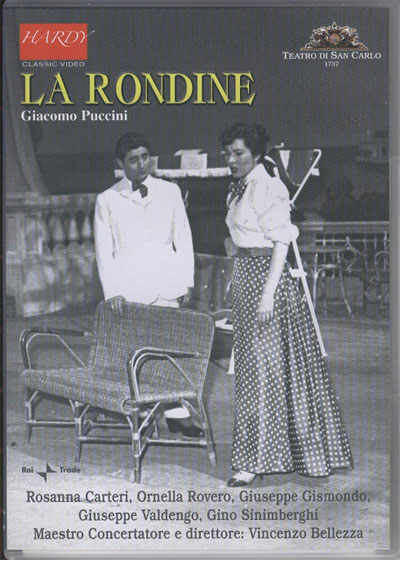

La Rondine: Rosanna Carteri, Giuseppe Gismondo, Ornella Rovero, Gino Sinimberghi, Giuseppe Valdengo.
Orchestra e Coro di San Carlo Napoli conducted by Vincenzi Bellezza.
Live recording of January 26th 1958.
1 DVD Hardy HCD4026.
This performance, a real find, dates from the last decade when Italy still had a living opera tradition and performances of Italian opera in Italian theatres were cast with Italians only.
This doesn’t only show here in the clear pronunciation but especially in the ‘schwung’ (a not very Italian word) of the whole performance. Everybody sings out while at the same time everyone seems so relaxed and sure in their role in what was a rare outing of this opera at the time. Main interest goes to Rosanna Carteri as Magda .
The lady preferred to retire far too early to raise a family and what a loss this was. The voice has warmth, thrust and strength in the upper register. She sings Puccini in what nowadays would be called “a little bit too veristic” but which is definitely nearer to the composer’s intentions than what modern sopranos do who handle Puccini like they are singing Richard Strauss or even worse, Mozart. Magda was created by Gilda Dalla Rizza who was not above a fine sob now and then and Carteri too has a little tear in the voice. In the fifties, television and its harsh lights had the disadvantage of making people at least five years older than they were but still the soprano looks fine and acts very convincingly. Indeed, according to modern pundits singers just stood and delivered in those days before ‘Regietheater’ became unavoidable but this performance proves that everybody very well knows how to behave believably on a scene without acting hammy. Maybe Ornella Rovere as Lisette looks indeed a bit too old for the role and the voice has the sharp edge of a lot of provincial Italian sopranos but still she knows how to make the most of the role. Giuseppe Gismondo is one of those Italian tenors who nowadays would have had a much bigger career. The voice is young and strong and unmistakably Italian. He knows when too scale down but it is true that it is a spinto voice without too much charm. The role needs more sweetness in the voice and Gismondo has more steel than sugar.
For those who only know him from the commercial recording of Mascagni’s Il piccolo Marat this will be a worthy addition to their collection. As he is a rather small guy, clearly very southern Italian, his somewhat gauche behaviour on the scene corresponds well with the character of Ruggero. It is a pleasure not only to hear but at last to see Gino Sinimberghi in action. He is a wonderful actor and a good singer who nowadays too would probably have been a primo tenore. And as Rambaldo there is Toscanini’s favourite baritone Giuseppe Valdengo, as dry of voice as on his recordings with the Parma metronome. Conductor Vincenzo Bellezza clearly loves the score. In the second act he succeeds in giving us the ‘joie de vivre’ of the Parisian crowd while in the last act he fully realizes the small tragedy that is taking place without overindulging in sentimentalizing tempi. The score is given very complete without the small cuts still employed at the time. Of course Ruggero’s fine entrance aria ‘Parigi, è la citta dei desideri’ is not in as this magnificent piece was only reinstated very recently in performances. The sound is excellent though of course not stereo and the singers are prominent. The picture quality in the many close-ups is excellent (no easy thing with the kinescope system) though a little bit murky when the camera is panning. A masterpiece like La Rondine is best savoured in colour, in best possible sound etc. but as a second buy this performance seems to be necessary to me as it is a worthy reminder of a civilisation gone with the wind; a souvenir of those long gone days when Italy still sang.
Jan Neckers, Opera Nostalgia